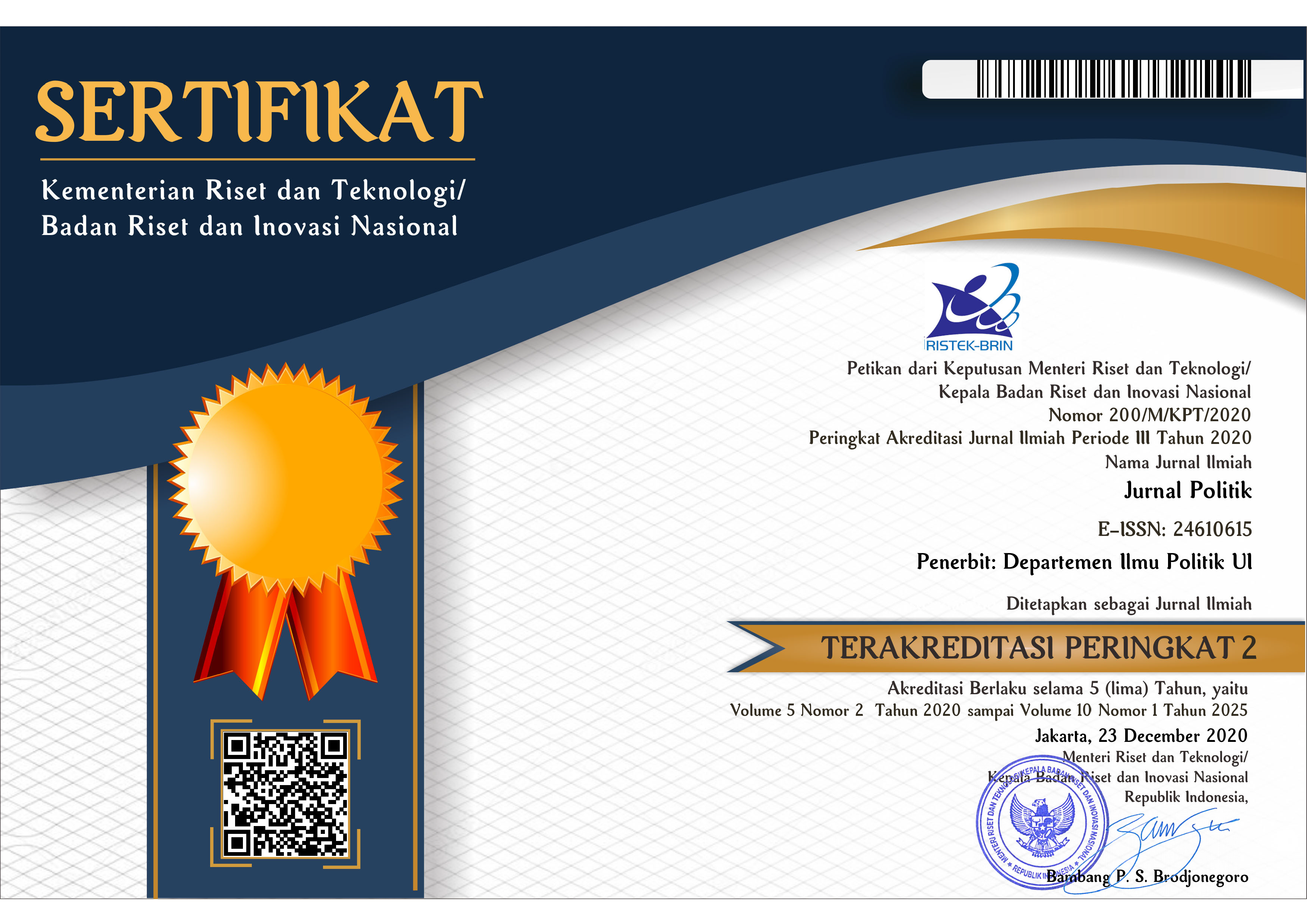Abstract
This research analyses the Co-production process in developing Kampung Warna-Warni Jodipan, Malang City, and its implications for city government regulations regarding urban slum areas. The author uses descriptive qualitative data to explore the co-production process based on primary data obtained through semi-structured interviews with residents of Kampung Warna-Warni and the local Malang city government. Research findings show that the active participation of the community, students, private sponsors, and government agents can create a balance between community autonomy and the need for supervision and assistance from the government, as well as strengthening the bargaining position of the residents of Kampung Warna-Warni. Furthermore, the Kampung Warna-Warni improvement program has become a pilot model used by the Malang City government to regulate other slum settlements. The context of this research is limited to the case of Kampung Warna-Warni Malang City, which succeeded in getting recognition from the government, so the stages of the Co-production process will differ from the case of slum settlements, which the government does not recognise. Future researchers can explore this matter to find comparative patterns of co-production development in recognized and non-recognized slum settlements.
References
Adams, Ellis Adjei, and Godfred Odei Boateng. 2018. “Are Urban Informal Communities Capable of Co-production? The Influence of Community–Public Partnerships on Water Access in Lilongwe, Malawi.” Environment and Urbanisation 30 (2): 461–80.
Adinafa, Moniq. 2021. “Indonesia Slum Upgrading Program From collaborative to co-production.” Master Thesis. University of Groningen and Institut Teknologi Bandung.
Akbar, Taufik, and Faqih Alfian. 2018. “Kampung Tematik sebagai Bentuk Partisipasi Masyarakat dalam Permasalahan Permukiman Kumuh di Kota Malang.” Wahana, 70 (2): 37–48. https://doi.org/10.36456/wahana.v70i2.1741.
Alfian, Faqih, and Taufik Akbar. 2020. “Upgrading Slum Area, Development and Hidden Inequality (Case Study: Kampung Warna-Warni and Kampung Tridi).” Jurnal RUAS 18 (2): 70–9. https://doi.org/10.21776/ub.ruas.2020.018.02.6.
Alfiatun, Sumiati Nafisah. 2021. “Strategi Pembangunan Wisata Kampung Warna Warni Sebagai Upaya Mewujudkan Kemandirian Ekonomi (Studi Pada Kelurahan Jodipan Kecamatan Klojen Kota Malang).” Bachelor Thesis. Universitas Islam Malang.
Badan Pusat Statistik. n.d. “Jumlah Migrasi Masuk Menurut Bulan dan Kecamatan di Kota Malang (Jiwa), 2020-2022.” Badan Pusat Statistik. https://malangkota.bps.go.id/indicator/12/309/1/jumlahmigrasi-masuk-menurut-bulan-dan-kecamatan-di-kota-malang.html
Banana, Evans, Chitekwe-Biti, Beth, and Walnycki, Anna. 2015. “Co-producing inclusive city-wide sanitation strategies: Lessons from Chinhoyi, Zimbabwe.” Environment and Urbanisation 27 (1): 35–54.
Brandsen, Taco, Verschuere, Bram, and Steen, Trui. 2018. Co-production and co-creation: Engaging citizens in public services. Taylor & Francis.
Burgess, Ernest Watson. 1925. The Growth of the City. London: The University of Chicago Press.
Falina, Erna Dewi and Bakti Setiawan. 2021. “Peran Stakeholder pada Placemaking Kampung Warna Warni dan Kampung Tridi.” Master Thesis. Universitas Gajah Mada.
Goodwin, Geoff. 2019. “The Problem and Promise of Coproduction: Politics, History, and Autonomy.” World Development 122: 501–13. https://doi.org/10.1016/j.worlddev.2019.06.007
Harahap, Fitri Ramdhani. 2013. “Dampak Urbanisasi bagi Perkembangan Kota di Indonesia.” Society 1 (1): 35–45. https://doi.org/10.33019/society.v1i1.40.
Hidayati, Inayah. 2021. “Urbanisasi dan Dampak Sosial di Kota Besar Indonesia: Sebuah Tinjauan.” Jurnal Ilmiah Ilmu Sosial 7 (2): 212–21. https://doi.org/10.23887/jiis.v7i2.40517.
Holston, James. 2009. “Insurgent Citizenship in an Era of Global Urban Peripheries.” City & Society 21 (2): 245–67. https://doi.org/10.1111/j.1548-744X.2009.01024.x.
Hosniyah and Agus Trilaksana. 2016. “KEBIJAKAN PEMERINTAH HINDIA BELANDA TERHADAP KOMUNITAS ARAB DI MALANG 1900-1935.” AVATARA e-Journal Pendidikan Sejarah 4 (3): 966–78.
Joshi, A and M Moore (2004), “Institutionalised co-production: unorthodox public service delivery in challenging environments”, Journal of Development Studies Vol 40, No 4, pages 31–49.
Komarudin. 2021. “Kampung Warna-Warni Jodipan Ikut Terdampak Banjir Bandang Malang.” Liputan 6. https://www.liputan6.com/lifestyle/read/4703212/kampung-warna-warni-jodipan-ikut-terdampak-banjir-bandang-malang?page=3.
Loeffler, Elke, and Tony Bovaird. 2016. “User and community co-production of public services: What does the evidence tell us?” International Journal of Public Administration 39 (13): 1006–19. https://doi.org/10.1080/01900692.2016.1250559.
Mangai, Mary S., and De Vries, Michiel S. 2018. “Co-production as deep engagement: Improving and sustaining access to clean water in Ghana and Nigeria.” International Journal of Public Sector Management 31: 181–96.
Martono, Nanang. 2015. METODE PENELITIAN SOSIAL: Konsep-konsep Kunci. Depok: Rajawali Pers.
Mitlin, Diana, and Sheridan Bartlett. 2018. “Editorial: Co-production – key ideas.” Environment and Urbanisation. 30(2), 355–366. https://doi.org/10.1177/0956247818791931.
Nurdin, Andi Heny Mulawati. 2017. “Integrasi Sistem Perencanaan Partisipatif, Teknokratif, dan Politis dalam Perencanaan dan Penganggaran Program Pemberdayaan Ekonomi Masyarakat Kota.” Jurnal MP (Manajemen Pemerintahan) 4 (1): 1–18.
Roy, Ananya. 2011. “Slumdog Cities: Rethinking Subaltern Urbanism.” International Journal of Urban and Regional Research 35 (2): 223–38. https://doi.org/10.1111/j.1468-2427.2011.01051.x.
Watson, Vanessa. 2014. “Co-production and collaboration in planning-The difference.” Planning Theory & Practice 15: 62–76. https://doi.org/10.1080/14649357.2013.866266.
Recommended Citation
Alfian, Faqih; Ruriana, Alvinda Putri; Ayu, Galuh Anissa Sekar; Adiputra, Bayu Galen; Marpaung, Nethaneel Yobel; and Alwan, Ken Arya Fauzan
(2024)
"Co-Production Process of Kampung Warna-Warni: Societal Active Participatory in the Urban Slum Management,"
Jurnal Politik: Vol. 10:
Iss.
2, Article 2.
DOI: 10.7454/jp.v10i2.1200
Available at:
https://scholarhub.ui.ac.id/politik/vol10/iss2/2


